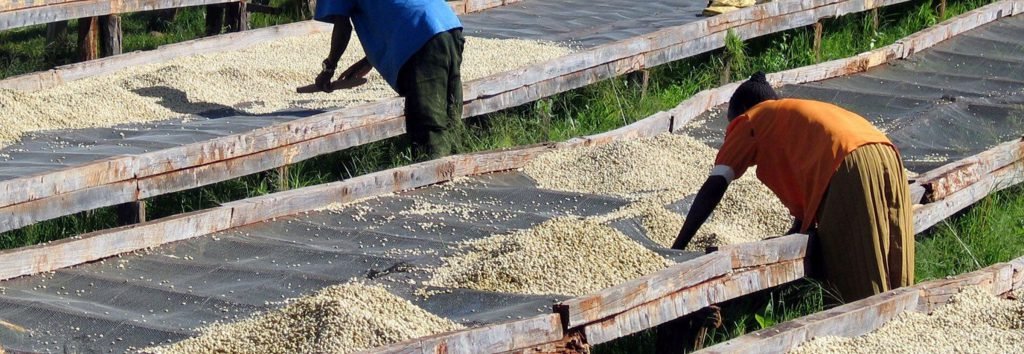Discover the pivotal role that Perfect Daily Grind (PDG) plays in the promotion of specialty coffee. As the specialty coffee industry continues to grow, competitions and events have become essential platforms for baristas, roasters, and coffee enthusiasts to showcase their expertise and innovation. PDG, a renowned digital coffee publication, has become a valuable resource for individuals in the industry to stay informed about the latest trends, techniques, and news. By providing high-quality educational content and hosting events, PDG actively contributes to the advancement and sustainability of the specialty coffee community. Whether you’re a passionate coffee professional or an avid coffee consumer, PDG is the perfect guide to navigate the world of specialty coffee.
Industry Production & Trade

This image is property of perfectdailygrind.com.
How does the timing of capital affect coffee farmers?
When it comes to running a coffee farm, timing is everything. The timing of capital can greatly affect coffee farmers and their ability to invest in their farms. Capital is essential for purchasing equipment, fertilizers, and other inputs needed for coffee production. But securing capital at the right time is crucial for farmers to optimize their yields and maintain the health of their crops.
The timing of capital is especially critical during key stages of the coffee production cycle, such as planting, harvest, and post-harvest processing. For example, coffee farmers need capital in the planting stage to purchase high-quality seedlings and ensure that they are properly nourished and cared for. Without access to capital at this stage, farmers may struggle to establish healthy coffee plants, leading to lower yields in the future.
During the harvest season, coffee farmers need capital to hire additional labor and invest in equipment for harvesting and processing the cherries. The availability of capital at this stage can determine whether farmers are able to carry out the harvest efficiently and effectively. Lack of capital during this crucial period can result in delays in harvesting, which can negatively impact the quality of the coffee and decrease its market value.
Similarly, post-harvest processing requires capital for activities such as sorting, drying, and storage. Timely access to capital is essential for coffee farmers to maintain the quality of their coffee during this stage and prevent spoilage or damage. Without proper funding, farmers may be forced to rush the processing or use outdated and inefficient equipment, leading to a decrease in the quality of the coffee and potential financial losses.
Overall, the timing of capital plays a crucial role in the success of coffee farmers. With access to timely funding, farmers can make necessary investments at each stage of the production cycle, ultimately leading to higher yields, better quality coffee, and improved incomes.

This image is property of perfectdailygrind.com.
How are Indian coffee farmers recovering after recent storms?
The recent storms in India have had a significant impact on the coffee industry, particularly on coffee farmers who faced crop damage and destruction of their infrastructure. However, despite the challenges, Indian coffee farmers have shown incredible resilience and determination in recovering from the aftermath of these devastating natural disasters.
One key factor in the recovery process has been the support provided by local and international organizations, as well as the government. These entities have stepped in to provide financial assistance, technical expertise, and resources to help farmers rebuild their farms and infrastructure. The support includes access to capital for replanting damaged crops, guidance on best farming practices, and training on climate-resilient farming techniques.
Additionally, the coffee community has come together to support and uplift affected farmers. Various initiatives and programs have been launched to raise funds and provide direct assistance to those in need. Coffee traders, roasters, and consumers have shown immense solidarity with Indian coffee farmers, recognizing the importance of supporting them in their recovery efforts.
Another crucial aspect of the recovery process is the implementation of long-term solutions to mitigate the impact of future storms. This includes planting more resilient coffee varieties, improving drainage systems, and implementing soil erosion control measures. By taking proactive measures, Indian coffee farmers are working towards building a more sustainable and resilient coffee industry that can better withstand future climatic challenges.
Despite the setbacks caused by the storms, Indian coffee farmers are determined to rebuild and revitalize their farms. Through the combined efforts of the government, organizations, and the coffee community, these farmers are gradually recovering and adapting to the changing climate, ensuring the long-term sustainability of the Indian coffee industry.

This image is property of perfectdailygrind.com.
How has robusta production in Nicaragua developed in recent years?
Nicaragua is known for its high-quality Arabica coffee, but the production of robusta coffee has also been gaining momentum in recent years. Robusta, which is more resistant to diseases and pests, has emerged as an attractive alternative for coffee farmers in Nicaragua looking to diversify their crops and improve their resilience against potential challenges.
The development of robusta production in Nicaragua can be attributed to several factors. Firstly, the changing climate patterns and the prevalence of diseases such as coffee leaf rust have posed significant challenges for Arabica production. Robusta, on the other hand, is better equipped to withstand these challenges, making it a viable option for coffee farmers.
Furthermore, the demand for robusta coffee has been increasing globally, especially in markets where it is used for instant coffee and blends. Nicaragua’s favorable climate and growing conditions make it well-suited for robusta production, allowing farmers to tap into this growing market and potentially increase their profitability.
To support the development of robusta production, the government and various organizations have provided assistance and resources to coffee farmers. This support includes training on robusta cultivation techniques, access to improved varieties, and technical guidance on post-harvest processing. By equipping farmers with the necessary knowledge and resources, these initiatives aim to enhance the quality and productivity of robusta coffee in Nicaragua.
The development of robusta production in Nicaragua not only provides farmers with additional income opportunities but also contributes to the overall competitiveness and sustainability of the coffee sector. By diversifying their crop portfolio, coffee farmers can mitigate risks associated with climate change and market fluctuations, ensuring a more stable and prosperous future for the Nicaraguan coffee industry.

This image is property of perfectdailygrind.com.
Can coffee production in the Amazon be sustainable?
Coffee production in the Amazon region presents unique challenges and opportunities in achieving sustainability. The Amazon rainforest is not only a vital ecosystem but also a biodiversity hotspot, making the conservation of its natural resources a priority. Therefore, coffee production in this fragile environment must be carried out in a way that minimizes environmental impact and promotes social and economic sustainability.
One of the key challenges in achieving sustainability in Amazonian coffee production is the protection and conservation of the rainforest. Deforestation for agriculture, including coffee farming, can lead to habitat destruction, loss of biodiversity, and soil degradation. To address this, sustainable farming practices such as agroforestry and shade-grown coffee cultivation are encouraged. These methods promote biodiversity conservation by preserving the natural forest canopy and providing habitat for wildlife.
Furthermore, sustainable coffee production in the Amazon emphasizes the use of organic farming practices and the reduction of agrochemicals. By minimizing the use of pesticides and fertilizers, farmers can protect local water sources and prevent pollution. Integrated pest management techniques and organic fertilizers are employed to maintain soil health and fertility while minimizing environmental impact.
Social sustainability is also a key aspect of sustainable coffee production in the Amazon. Ensuring fair wages and decent working conditions for coffee farmers and workers is essential. Many sustainable coffee initiatives in the region focus on empowering local communities, supporting small-scale farmers, and promoting gender equality in the coffee industry. By investing in social programs and providing access to education and healthcare, these initiatives contribute to the well-being and prosperity of coffee-growing communities.
While there are challenges to achieving sustainability in Amazonian coffee production, the region offers immense potential for creating a truly sustainable coffee industry. By adopting environmentally friendly practices, promoting social equity, and supporting local communities, the coffee sector in the Amazon can thrive while preserving the invaluable natural resources of one of the world’s most important ecosystems.

This image is property of perfectdailygrind.com.
Resolving environmental issues in coffee production
Environmental issues in coffee production have become a growing concern in recent years as the coffee industry seeks to address its impact on the planet. From deforestation and biodiversity loss to greenhouse gas emissions and water pollution, various environmental challenges need to be addressed to ensure the long-term sustainability of coffee production.
One key challenge is deforestation, which often occurs when forests are cleared to make way for coffee farms. This not only leads to the loss of important wildlife habitat but also contributes to climate change by releasing carbon dioxide into the atmosphere. To tackle this issue, initiatives such as shade-grown coffee and agroforestry promote the preservation of existing trees and the planting of new ones alongside coffee crops. These practices not only help to maintain biodiversity but also sequester carbon, mitigating the industry’s carbon footprint.
Another significant environmental issue in coffee production is the excessive use of water and its contamination from agrochemicals. Coffee processing often requires large amounts of water, which can lead to the depletion of local water sources and the contamination of rivers and streams with pesticides and fertilizers. To address this, water management techniques such as water recycling and the use of natural, biodegradable inputs are being implemented. These practices aim to reduce water consumption and minimize the environmental impact of coffee processing.
Additionally, greenhouse gas emissions from coffee production contribute to climate change. Various initiatives are working towards reducing emissions along the entire coffee value chain, from cultivation and processing to transportation and roasting. These efforts include the use of renewable energy, the implementation of energy-efficient technologies, and the promotion of carbon offset projects. By focusing on emissions reduction, the coffee industry can play a crucial role in mitigating climate change.
To resolve these environmental issues, collaboration is key. Stakeholders across the coffee supply chain, including farmers, traders, roasters, and consumers, must work together to implement sustainable practices and drive positive change. Certification schemes such as Rainforest Alliance and Fairtrade provide guidelines and standards for sustainable coffee production, helping to ensure that environmental considerations are addressed.
Overall, resolving environmental issues in coffee production requires a multi-faceted approach that includes implementing sustainable farming practices, reducing water consumption, minimizing greenhouse gas emissions, and promoting collaboration among all stakeholders. By prioritizing sustainability, the coffee industry can contribute to the preservation of the environment and the well-being of both people and the planet.


